Blog
Summer Camps Help Kids Grow

The summer camp industry in the U.S. dates back to the mid-1800s. Thomas W. Gunn established the Gunnery Camp, a camping program exclusively for his all-male students, in 1861 in Connecticut. Only thirteen years later, in 1874, the YWCA established a camp for young women in New Jersey designed to offer vacation for industrial workers who wouldn’t normally have access to leisure time and immersive recreational activities. Summer camps have been providing essential services, like education for children and rest for workers, since the beginning. The sector remains strong today. A 2024 study from the University of Michigan and the American Camp Association found that the U.S. camp industry has over twenty thousand camps in operation, contributes seventy billion dollars to the national economy, and supports almost one million workers.
Clearly summer camps have a rich history and significant economic impact in the U.S. Camps also play a key role in modern youth development. While outcomes for youth who attend summer camp can be complicated to measure and track, there is a wealth of research supporting the importance of camp experiences in young people’s lives.

In part, summer camps play a pivotal role because they fill a gap left by the extended break in the traditional school calendar. During the summer, kids are away from the structure, mentorship, socialization, and support offered by schools. While time away from the classroom can be a healthy break from the stress and rigor of academics, school breaks also expose kids to problems like lack of appropriate supervision, isolation from peers, and learning loss or stagnation. Youth summer camps address this problem through structured recreation programs, social activities, and mentorship from older campers and staff.
Summer camps are also valuable for youth because they often emphasize different developmental areas than school settings. For example, camps can help develop a sense of autonomy in young people by offering activities that encourage creativity and cooperation like arts and crafts. Opportunities for campers to take on leadership roles and participate in group decision-making also help youth develop confidence and a stronger sense of self. These are essential ingredients for a healthy transition into adulthood.

One study measured parent perceptions on the outcomes of camp for their children. In a sample of almost 2,500 people, researchers found statistically significant growth in ten different youth development components from the perspective of parents. These included a sense of independence, positive identity, ability to make friends and maintain peer relationships, and a desire to explore the world around them. In follow-up surveys administered six months after a camp experience, parents still described observing growth in the leadership qualities of their child as a result of attending camp.
As with any aspect of recreation, summer camp is not an accessible opportunity for all families. Camps can be expensive, may not provide transportation to and from the camp facility, might lack the infrastructure to support youth with disabilities, or might not feel welcoming to youth of color and LGBTQ+ youth. These factors may prevent a child from ever enrolling in camp and research tells us that demographic variables also affect the experiences of youth who do attend camp. NRF is proud to support our grantees who offer positive summer recreation experiences for kids across the country and are dedicated to ensuring that more kids have access to the adventure and community of summer camp, regardless of their background or identity.
